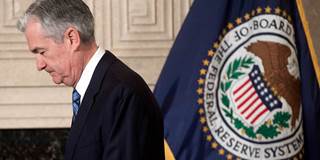Major central banks’ fixation on inflation betrays a guilty conscience for serially falling short of their targets. It also raises the risk that in fighting the last war, they will be poorly prepared for the next – the battle against too-high inflation.
CAMBRIDGE – Empirical relationships in economics are sufficiently fragile that there is even a “law” about their failure. As British economist Charles Goodhart explained in the 1980s, “any observed statistical regularity will tend to collapse once pressure is placed upon it for control purposes.” Central banks in advanced economies have recently been providing a few more case studies confirming Goodhart’s Law, as they struggle to fulfill their promises to raise inflation to the stable plateau of their numerical targets.

CAMBRIDGE – Empirical relationships in economics are sufficiently fragile that there is even a “law” about their failure. As British economist Charles Goodhart explained in the 1980s, “any observed statistical regularity will tend to collapse once pressure is placed upon it for control purposes.” Central banks in advanced economies have recently been providing a few more case studies confirming Goodhart’s Law, as they struggle to fulfill their promises to raise inflation to the stable plateau of their numerical targets.